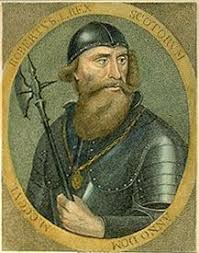Robert the Bruce: King of Scots
One of the Bruce's greatest achievements was his victory against the English at the Battle of Bannockburn in 1314, which led to a fully independent Scotland.
KINGS AND REGENTS OF SCOTLAND
4/7/20242 min read


Robert the Bruce: King of Scots
Robert the Bruce, also known as Robert I, was the King of Scots from 1306 until his death in 1329. He is considered one of the most renowned and influential figures in Scottish history. Born into a noble family, Robert the Bruce played a pivotal role in the Wars of Scottish Independence against England.
Ancestry and Family
Robert the Bruce was born on July 11, 1274, into a family with a strong claim to the Scottish throne. His father, Robert de Brus, was of Norman descent, and his mother, Marjorie, was the daughter of the Earl of Carrick. This lineage gave him a legitimate claim to the throne of Scotland.
His grandfather, also named Robert de Brus, had been one of the claimants to the Scottish throne after the death of Alexander III in 1286. However, it was Robert the Bruce who eventually emerged as the leading contender for the crown.
Marriage and Family Life
Robert the Bruce married multiple times throughout his life. His first marriage was to Isabella of Mar, with whom he had a daughter named Marjorie. After Isabella's death, he married Elizabeth de Burgh, who bore him several children, including his heir, David II.
Despite his numerous marriages, Robert the Bruce's family life was marked by tragedy. His daughter Marjorie died in childbirth, and his wife Elizabeth passed away in 1327. These losses deeply affected him, but he remained committed to his role as king and continued to lead Scotland.
Friends and Greatest Achievements
Robert the Bruce surrounded himself with loyal and capable allies, including James Douglas, Thomas Randolph, and Walter Stewart. Together, they fought against English forces and successfully secured Scotland's independence.
One of Robert the Bruce's greatest achievements was his victory against the English at the Battle of Bannockburn in 1314. This battle, fought near Stirling Castle, is considered one of the most significant events in Scottish history. It resulted in a decisive Scottish victory and solidified Robert the Bruce's position as king.
Another notable achievement was the signing of the Treaty of Edinburgh-Northampton in 1328. This treaty recognized Scotland as an independent kingdom and formally ended the Wars of Scottish Independence.
Brief History and Legacy
Robert the Bruce's reign was marked by his determination to secure Scotland's independence and establish himself as a strong monarch. Despite facing numerous challenges, he successfully led the Scottish resistance against English rule.
Robert the Bruce passed away on June 7, 1329, leaving behind a legacy of bravery and resilience. His efforts paved the way for the future independence of Scotland and continue to inspire generations of Scots.
Today, Robert the Bruce is remembered as one of Scotland's greatest heroes. His story has been immortalized in literature, film, and popular culture, ensuring that his legacy lives on.
